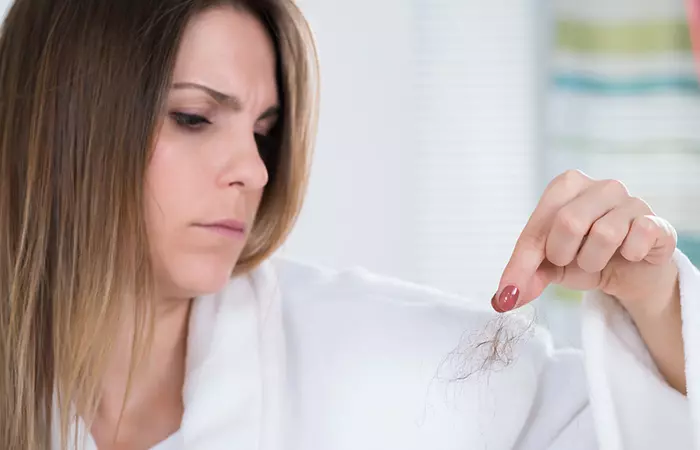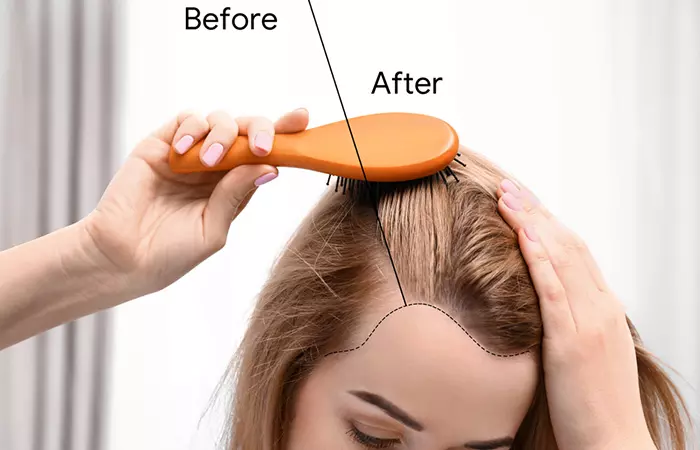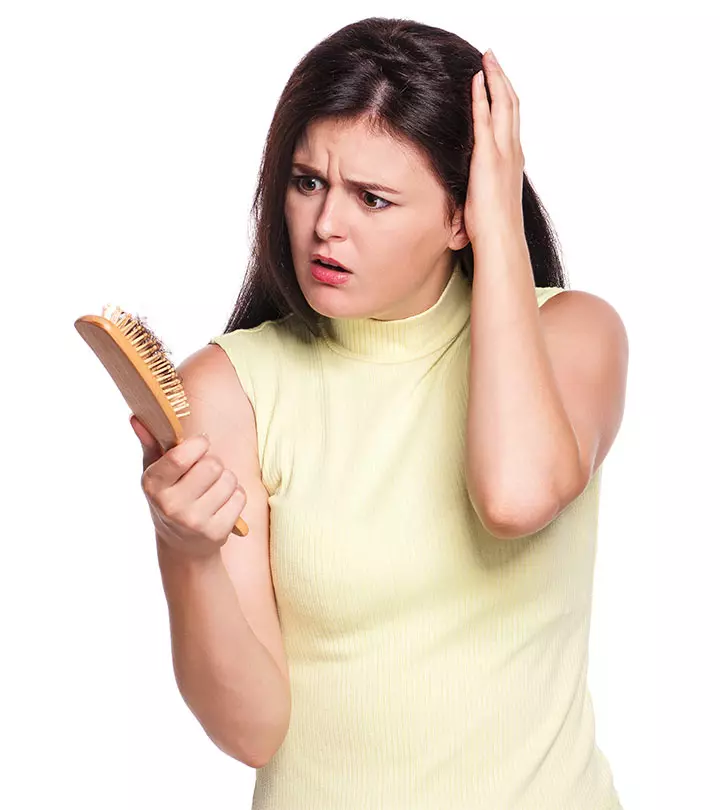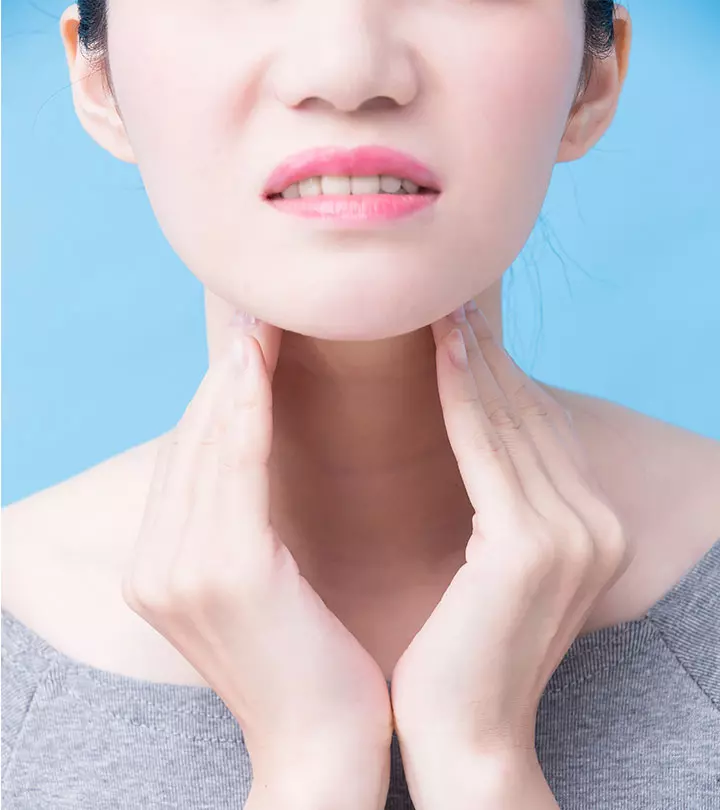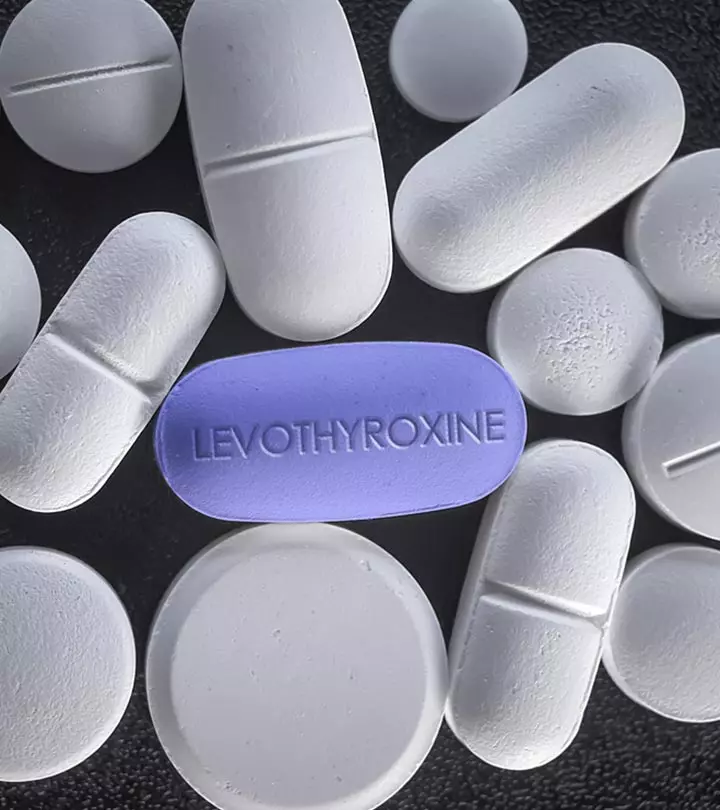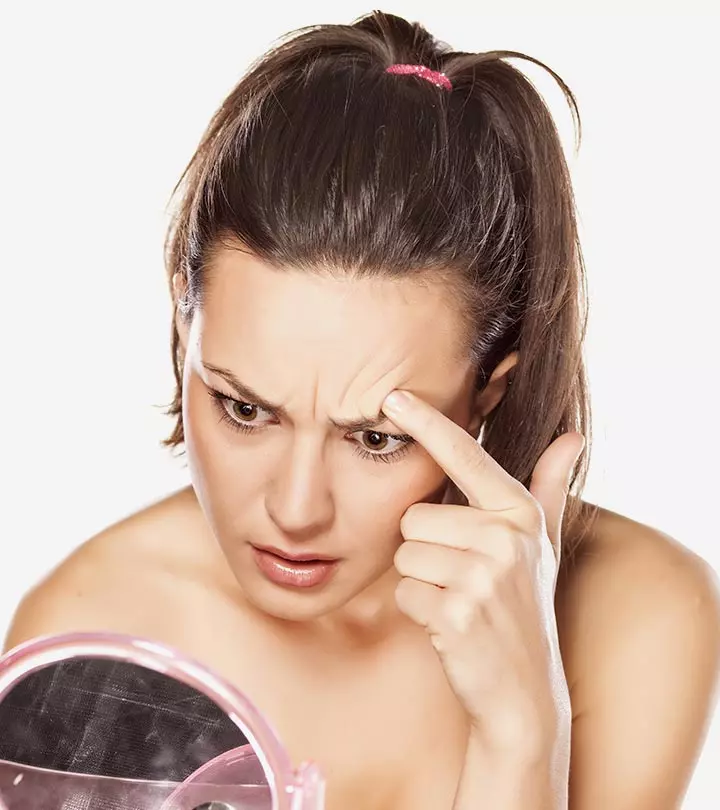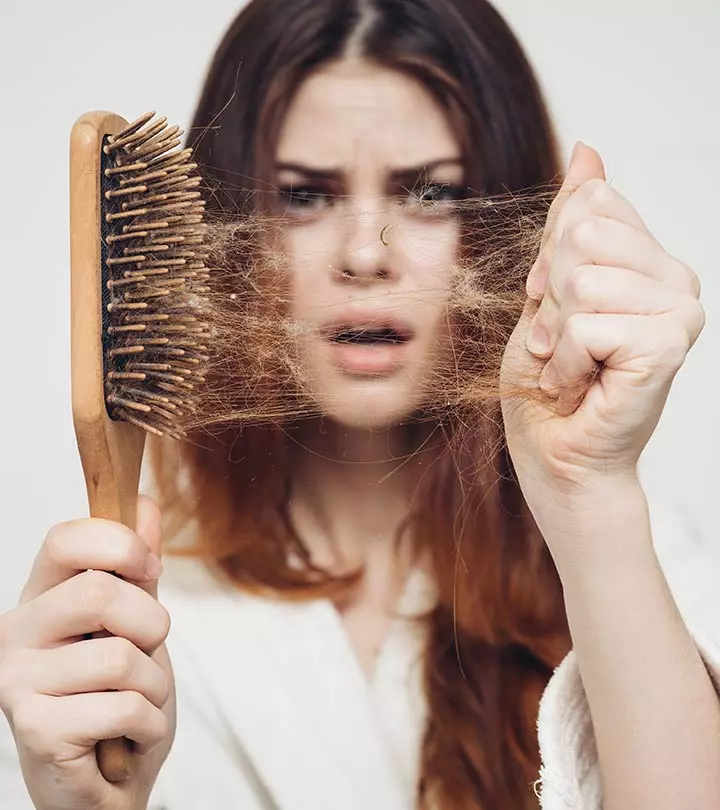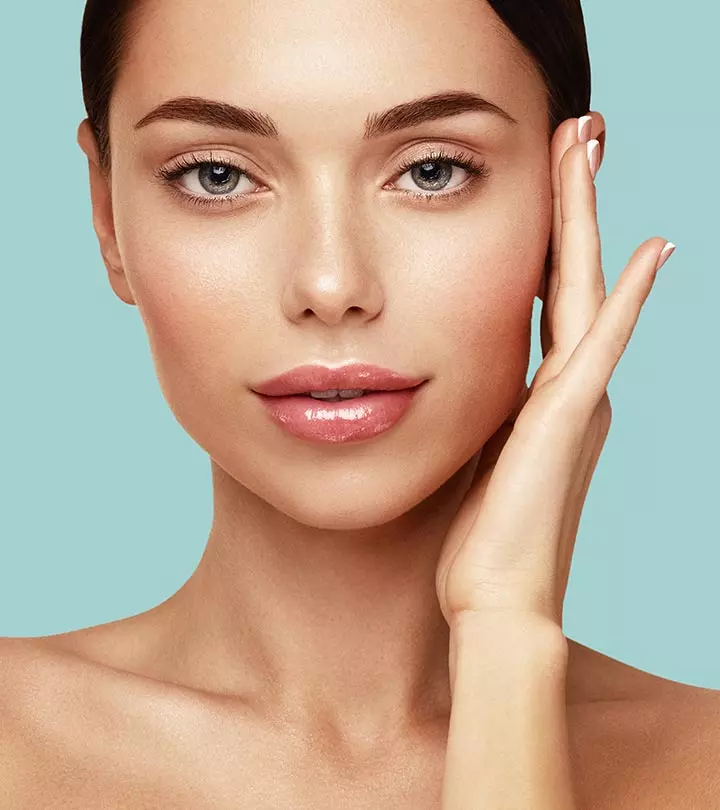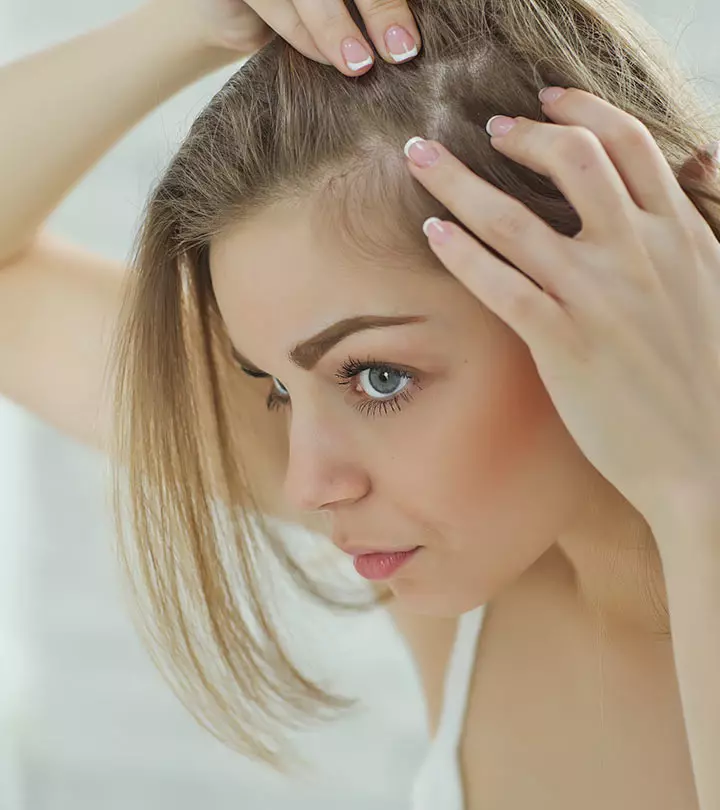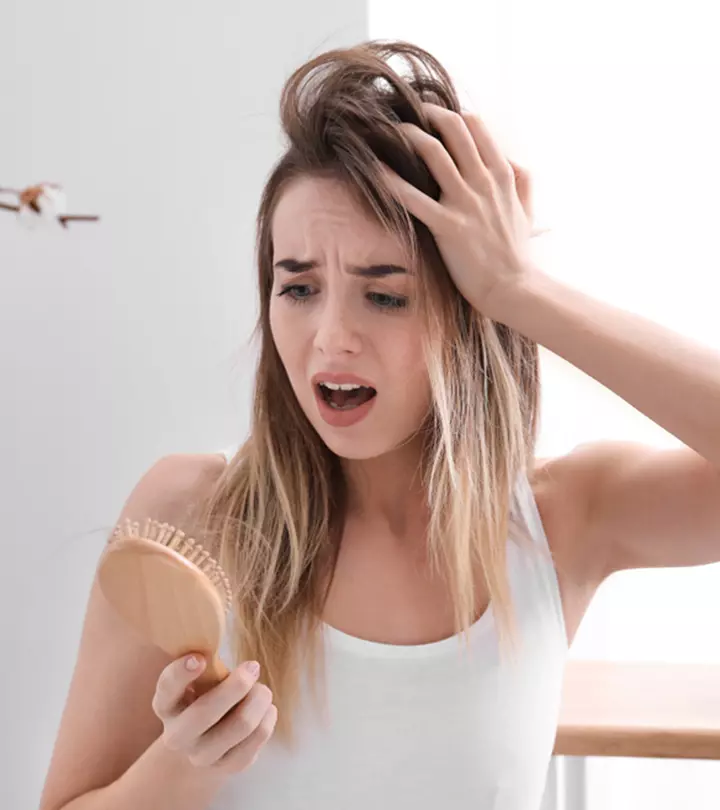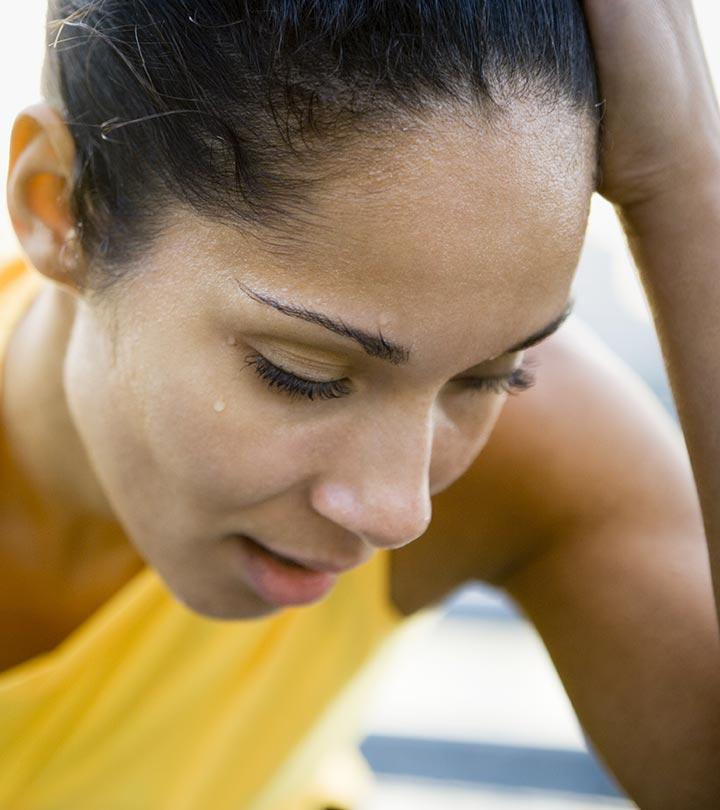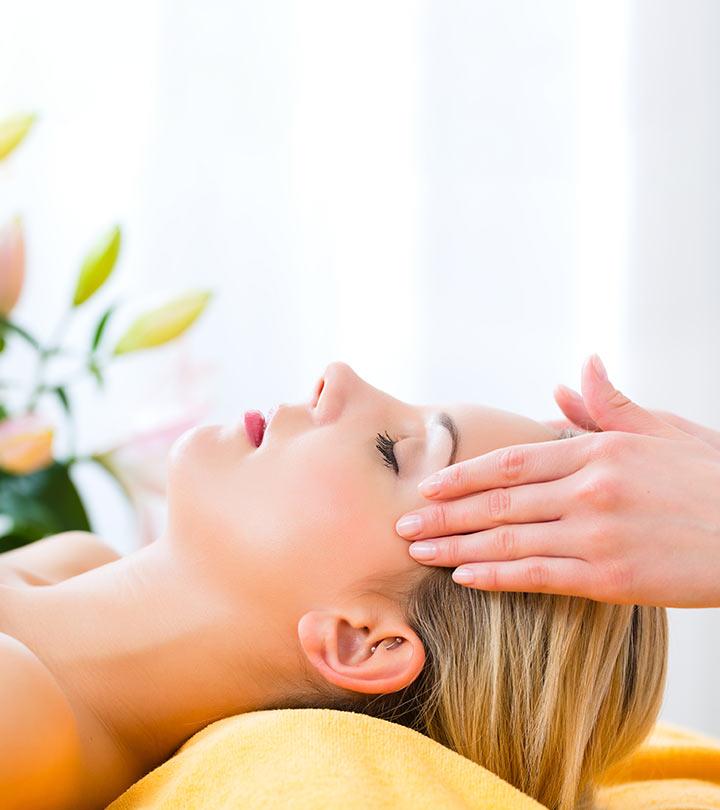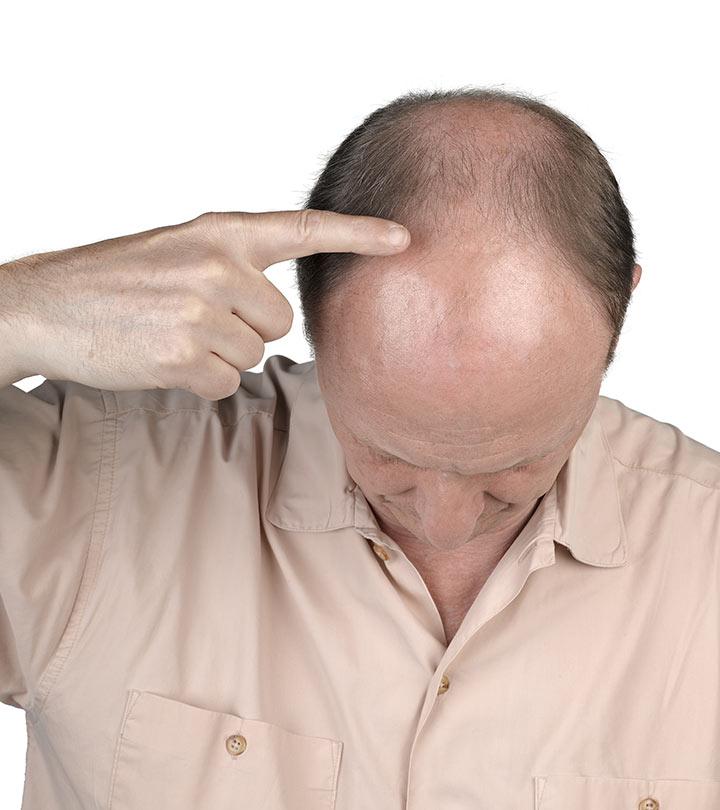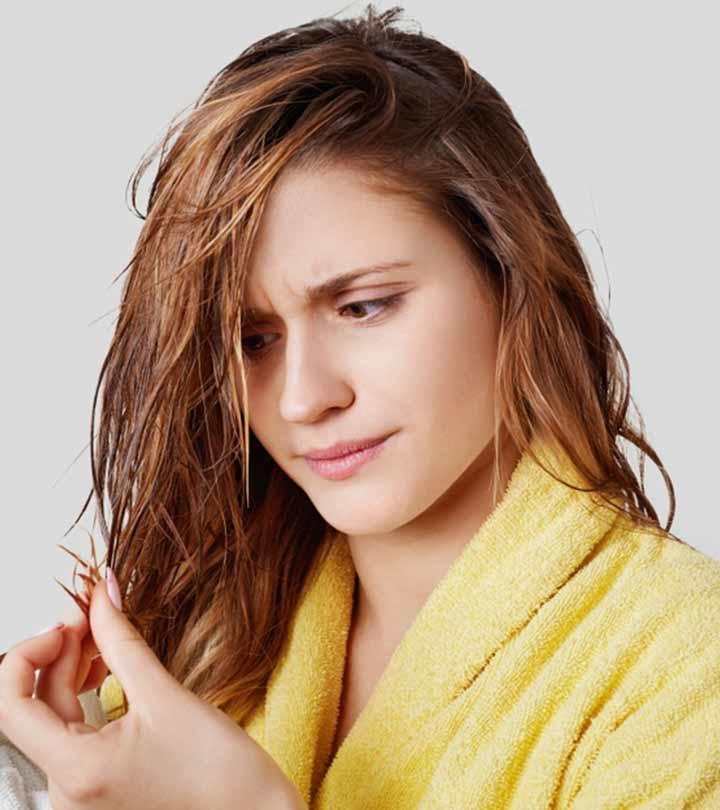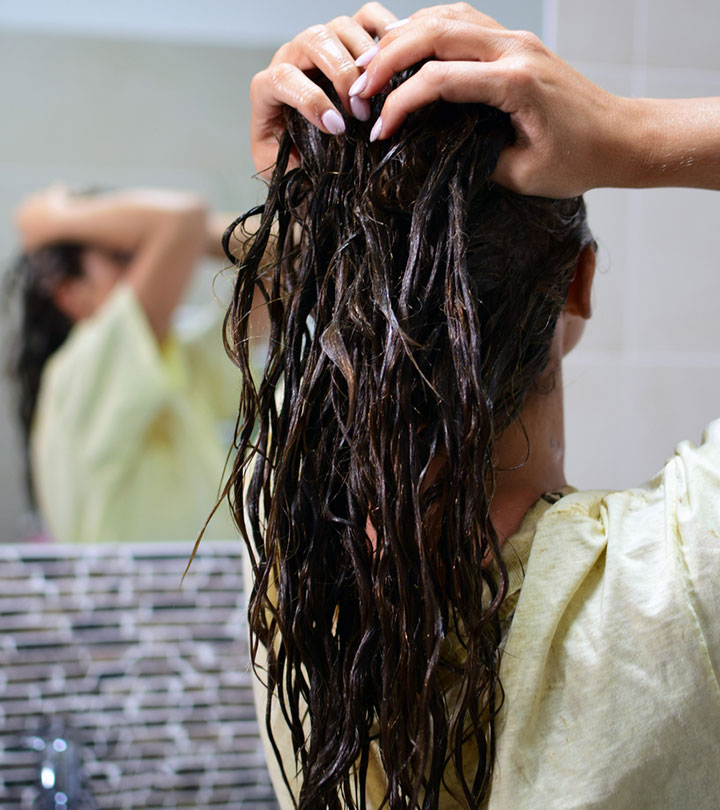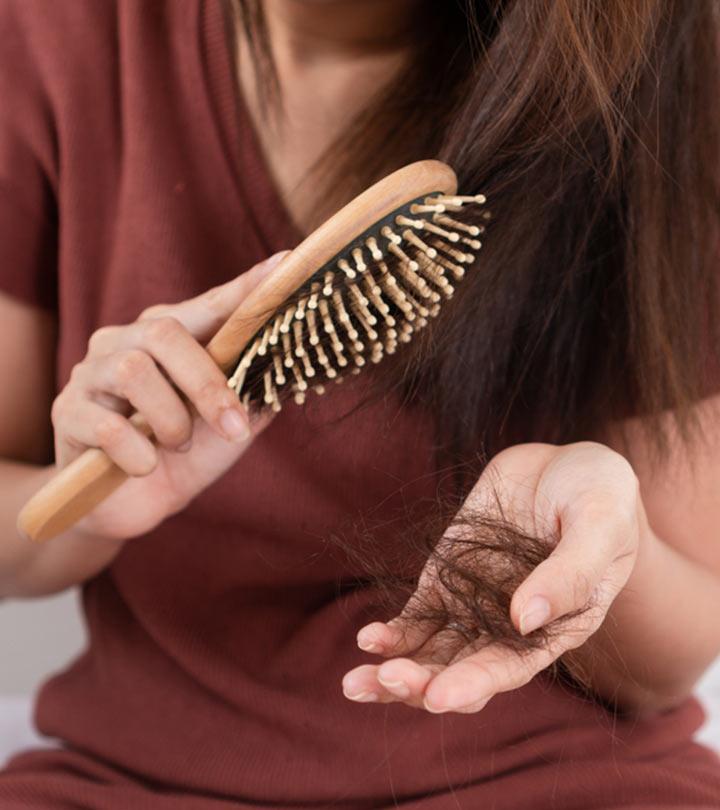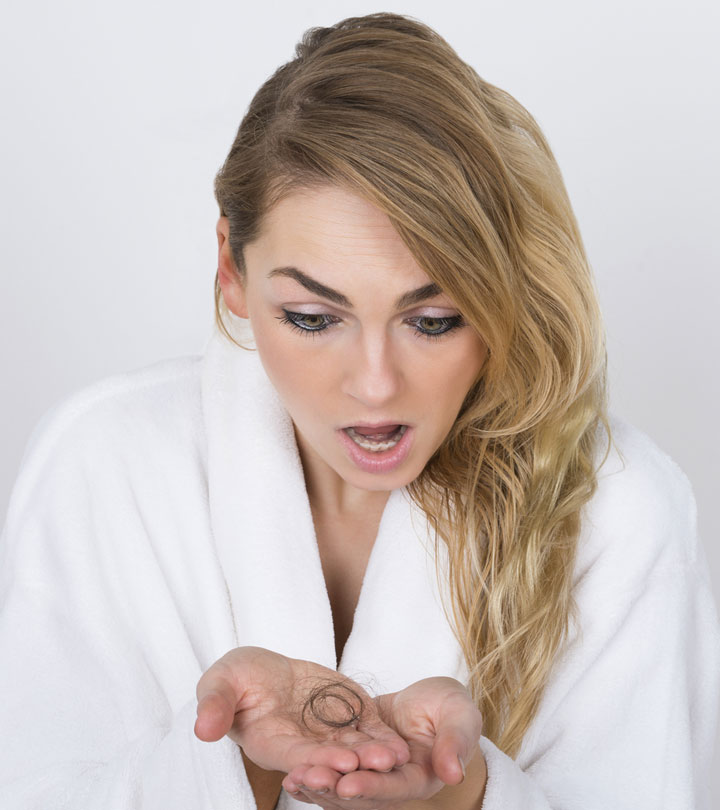How To Combat Thyroid Induced Hair Loss Using Home Remedies
Deal with hair loss problems caused by thyroid conditions by employing natural cures.
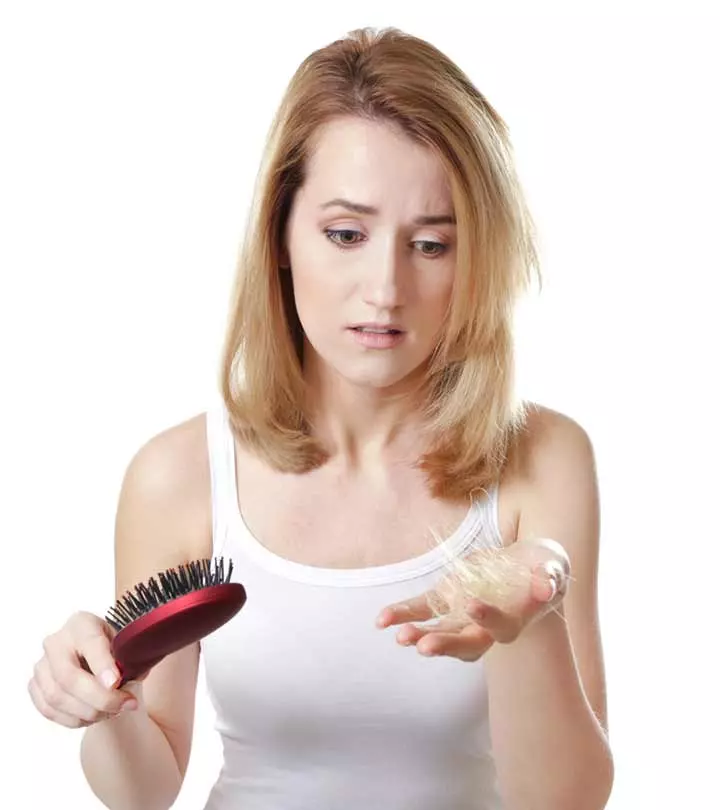
Image: Shutterstock
Irregular thyroid levels are one of the reasons that can exacerbate hair loss. Here, we will help you understand how to combat thyroid-induced hair loss. Fortunately, hair loss due to the thyroid is temporary. One can control the hair fall by taking some medications and making diet changes. In this article, we look into thyroid-induced hair loss, how to combat it, and more. Continue reading.
In This Article
Thyroid Disorders And Hair Loss The Link
Thyroid disorders (hyperthyroidismi Overproduction of thyroid hormones by the thyroid gland that causes an increased metabolism, irregular heartbeat, and excess sweating. , hypothyroidism, Hashimoto's diseasei An autoimmune disorder where the immune system attacks its own thyroid gland, resulting in thyroid hormone deficiency. , and Graves diseasei An autoimmune condition that causes the thyroid gland to become overactive and increase the production of the thyroid hormone. ), excessive thyroid supplementation, and antithyroid drugs can result in a condition called telogen effluviumi A form of temporary hair loss experienced by a person after a traumatic or stressful event like surgery or childbirth. , where the hair growth cycle ends prematurely. Thyroid hormones (T3 and T4) regulate the hair follicle function. Disruption in their production can result in increased hair shedding, hair loss, and hair thinning (1). Studies have also linked severe and prolonged hypothyroidism and hyperthyroidism to hair loss (2).
 Did You Know?
Did You Know?Is Your Hair Loss Due To A Thyroid Disorder?
Hair loss is a natural phenomenon that increases with age. However, how to identify if your hair loss is associated with a thyroid disorder? You may check for the following symptoms.
Symptoms of hair loss associated with thyroid disorders (4)
- You have hair loss throughout the scalp and not in discrete areas. Uniformly sparse scalp hair is a symptom of thyroid dysfunction. Alopecia areata where patchy hair loss happens is usually associated with autoimmune thyroid disease.
- You experience slow and gradual thinning of hair. Since thyroid disorders, like hypothyroidism, develop over a period, the symptoms also take time to manifest.
- You observe dry, brittle hair or thinning hair on your scalp.
- You have hair loss throughout your body.
It is evident thyroid disorders can cause hair loss. But can this be reversed? What does science say?
Can Such Hair Loss Be Reversed?
Telogen effluvium can be reversed by removing the trigger factors (5). Hence, hair regrowth could be possible if the underlying thyroid disorder is corrected. Generally, thyroid supplementation helps correct the hormone levels in the body and may aid hair loss reversal.
Keep in mind this is a slow process. Results can take anywhere between six to eighteen months to show (5). Results also can vary from person to person.
 Quick Tip
Quick TipIn the following section, we discuss the various treatment options available for hair loss due to thyroid disease.
How To Treat Hair Loss Due To Thyroid Disease
A simple blood test can help identify any imbalance in your thyroid hormones. This diagnosis is important to ensure you are on the right type and dose of supplemental thyroid hormone. Consult a licensed medical practitioner for diagnosis and treatment.
- Balance your hormones
Certain drugs such as levothyroxine, propylthiouracil, and methimazole are prescribed to correct hormone levels (6), (7). These keep your thyroid hormone levels under control and help minimize the risk of hair loss.
- Correct any nutritional deficiencies
Nutritional deficiencies (or malnutrition) may trigger hair loss too (5). Thus, it is essential to eat foods rich in the right nutrients (1).
- Iodine deficiency is linked to thyroid disorders. Hence, include iodine-rich foods like seafood, iodized salt, or even iodine supplements in your diet (8).
- Include foods rich in biotin, essential fatty acids, zinc, copper, and collagen in your diet (9), (10).
- Take a multivitamin supplement after consulting with your doctor. Vitamins A, E, C, and B complex are essential for proper hair growth (10).
- Iron-rich foods such as liver, green leafy vegetables, and eggs can help fight hair loss related to thyroid disorders (11), (12). Low ferritin (a protein that stores iron) has been linked to hair loss (13).
- Reduce inflammatory foods
- Avoid inflammatory foods such as sugar, fried foods, processed foods, and red meat. These may aggravate your thyroid gland.
- Include anti-inflammatory foods like turmeric and ginger (14).
Emma Tara, a content creator, recounted her experience of treating hair loss caused due to thyroid imbalance. According to her, it is important to understand your deficiencies and treat them accordingly. She said, “The way that I like to make sure I’m getting enough nutrients and vitamins in my diet is by eating well. So I try to eat a lot of foods with healthy fats in them. So I do eat salmon and I do eat avocado and this definitely helps with your overall hair health (i).”
- Medical treatment options
- Radiation therapy can help eliminate rogue cells that cause hormonal imbalances. You also may go for hormone replacement therapy. Your hair growth can improve once the hormone levels are back to normal.
- Thyroid disorders like goiter, hyperthyroidism, and thyroid cancer may need surgical interventions like thyroidectomy where a part of the entire gland is removed. However, this is often the last resort. A good diet, supplementation, and exercise post-surgery might regrow lost hair.
- Finasteride and minoxidil are FDA-approved drugs for treating hair loss (15). However, ensure you speak to your doctor before going for any of them.
Home Remedies For Treating Hair Loss Due To Thyroid Disorders
Most of these home remedies and hair care practices are not backed by scientific evidence. However, anecdotal testimonies suggest they are safe. Consult your endocrinologist if you have any concerns.
- You can treat adrenal fatigue with a proper diet and yoga. While medications address hormonal imbalances, meditation and yoga may help lower the thyroid levels and manage the stress that aggravates hair loss (16). Try to meditate for at least 20 minutes every day. Indulging in regular yoga sessions may improve blood circulation and regulate your thyroid function. Specific yoga poses like Sarvangasana (shoulder stand) may improve thyroid health and Uttanasana (Forward Bend) and Sasangasana (Rabbit Pose) may increase blood circulation in the scalp, thus promoting hair growth.
- While undergoing thyroid treatment, you must take good care of your hair. Use mild shampoos, avoid excessive heat styling, and be gentle when handling your hair to prevent further damage.
- You can reduce stress with aromatherapy. Massaging your hair with the essential oils of rosemary, lavender, or eucalyptus may improve hair growth. Remember to dilute the essential oils with carrier oils like that of coconut or jojoba before application. Always perform a patch test before you start using essential oils for hair growth.
Emma Tara further spoke about the benefits of essential oils for her hair. She said, “I love essential oils. I add a couple of drops of either lavender, peppermint, or eucalyptus into a hair mask. Some doctors say that there aren’t any ;roen studies to show that they have any health benefits but in my experience, they help me.”
- Herbs like chaste berry, palmetto, false unicorn, dong quai, and red clover are known to treat hair loss. However, consult a doctor before you start using them.
- Methods to boost blood flow to hair can improve hair growth. These can include a hot oil massage or inversion method. Consult the respective experts for more details.
- Avoid hairstyles like tight buns or ponytails that tug at your hair and weaken it, making it prone to breakage and loss.
Infographic: Thyroid-Induced Hair Loss: Diet, Hair Care, And More
Thyroid disorders, like hypothyroidism and hyperthyroidism, can cause hair loss. You may not necessarily notice baldness or missing patches. Instead, your hair may begin to seem thinner all over. It can, however, be reversed with the right treatment and a targeted diet. The following infographic lists the foods to eat and avoid and some of the best essential oils you may use to improve your hair health and growth. Check it out. Illustration: StyleCraze Design Team
Irregular thyroid levels may cause hair loss and hair thinning. Thyroid hormones help regulate hair follicles. Therefore, any dysfunction in their production due to genetics or lifestyle changes can result in hair loss. You can reverse hair loss by identifying the triggers and treating the underlying issues. There are thyroid supplements that help regulate hormone levels and improve hair health. However, the results may vary from person to person and take about a year or more. Consuming a balanced diet and proper treatment can help combat thyroid-induced hair loss. Consult a doctor if you feel your hair loss is due to thyroid issues.
Frequently Asked Questions
Will my hair grow back after taking levothyroxine?
Yes. Levothyroxine is used to treat hypothyroidism and may cause temporary hair loss as a side effect.
Does biotin increase or decrease thyroid levels?
Yes. Intake of biotin may result in a false diagnosis of hypothyroidism (17).
Does iodine help in hair growth?
Yes. The thyroid gland produces thyroxine and triiodothyronine that dictate your hair growth rate with the help of iodine. So, its deficiency may lead to hypothyroidism (18).
Key Takeaways
- Thyroid disorders, excessive thyroid supplementation, and antithyroid medications can cause temporary hair loss.
- Correcting the underlying thyroid condition may result in hair regrowth.
- Balancing your hormones, treating nutritional deficiencies, and radiation therapy are some treatments for thyroid issues.
- A well-balanced diet and proper medical supervision are necessary to assist with the process of regrowing your hair.
Dealing with hair fall due to thyroid issues? Watch this informative video to learn effective treatments for thyroid-related hair loss. Don’t let your hair suffer—click now to get the expert advice you’ve been searching for.
Personal Experience: Source
StyleCraze's articles are interwoven with authentic personal narratives that provide depth and resonance to our content. Below are the sources of the personal accounts referenced in this article.
i. Thyroid Disease And Hair Losshttps://www.youtube.com/watch?v=hdgFNtOBVOk
References
Articles on StyleCraze are backed by verified information from peer-reviewed and academic research papers, reputed organizations, research institutions, and medical associations to ensure accuracy and relevance. Read our editorial policy to learn more.
- Thyroid hormones directly alter human hair follicle functions: anagen prolongation and stimulation of both hair matrix keratinocyte proliferation and hair pigmentation.
https://academic.oup.com/jcem/article/93/11/4381/2627273 - A descriptive study of alopecia patterns and their relation to thyroid dysfunction
https://www.ncbi.nlm.nih.gov/pmc/articles/PMC3746235/ - Evaluation and treatment of hyperthyroidism and hypothyroidism
https://pubmed.ncbi.nlm.nih.gov/15543918/ - Thyroid Disease: A Checklist of Skin, Hair, and Nail Changes.
https://www.aad.org/public/diseases/a-z/thyroid-disease-skin-changes - Telogen effluvium: a review.
https://www.ncbi.nlm.nih.gov/pmc/articles/PMC4606321/ - Antithyroid Drugs.
https://www.ncbi.nlm.nih.gov/pmc/articles/PMC4480840/ - Levothyroxine
https://pubchem.ncbi.nlm.nih.gov/compound/Levothyroxine - Office of Dietary Supplements – Iodine.
https://ods.od.nih.gov/factsheets/iodine-consumer/ - Nutrition and Hair.
https://www.sciencedirect.com/science/article/abs/pii/S0733863512001039?via%3Dihub - Diet and Hair Loss: Effects of Nutrient Deficiency and Supplement Use.
https://www.ncbi.nlm.nih.gov/pmc/articles/PMC5315033/ - Diagnosing and Treating Hair Loss.
https://www.ncbi.nlm.nih.gov/pmc/articles/PMC5315033/ - The Impact of Iron and Selenium Deficiencies on Iodine and Thyroid Metabolism: Biochemistry and Relevance to Public Health.
https://www.liebertpub.com/doi/abs/10.1089/105072502761016494?cookieSet=1 - Iron plays a certain role in patterned hair loss.
https://www.ncbi.nlm.nih.gov/pmc/articles/PMC3678013/ - Physiological and Therapeutical Roles of Ginger and Turmeric on Endocrine Functions
https://www.worldscientific.com/doi/abs/10.1142/S0192415X11008762 - A Systemic Review on Topical Marketed Formulations, Natural Products, and Oral Supplements to Prevent Androgenic Alopecia: A Review.
https://link.springer.com/article/10.1007/s13659-020-00267-9 - Effect of 6 months intense Yoga practice on lipid profile thyroxine medication and serum TSH level in women suffering from hypothyroidism: A pilot study
https://www.researchgate.net/publication/299978649 - Effect of High-dose Biotin on Thyroid Function Tests: Case Report and Literature Review
https://www.ncbi.nlm.nih.gov/pmc/articles/PMC6103391/ - Dermatologic manifestations of endocrine disorders
https://www.ncbi.nlm.nih.gov/pmc/articles/PMC5682371/
Read full bio of Dr. Shruti Chavan
Read full bio of Eshna Das
Read full bio of Swathi E





